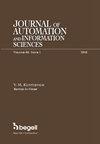TOOL FOR EFFECTIVE EXPERT INTEROPERABILITY IN E-GOVERNMENT DECISION SUPPORT SYSTEMS
Q3 Engineering
Journal of Automation and Information Sciences
Pub Date : 2021-03-01
DOI:10.34229/1028-0979-2021-2-4
引用次数: 0
Abstract
The article solves the problem of low efficiency of traditional methods for organizing the expert interaction in e-government decision support systems. It is shown that the activity of a highly qualified expert is still insufficiently organized, systematized and informationally provided, although expert assessments significantly affect the effectiveness, efficiency and economy of decisions. The requirements for automated expert systems are formulated. The features of the interaction of experts with each other and with the decision maker are taken into account. The place of automated expert systems in e-government decision support systems has been identified. It is shown that qualified users (experts who are able to evaluate (transform) the data, to generate variants of decision, to establish the rules for choosing the best) are an integral "element" of decision support systems architecture. At the same time, automated expert systems are mandatory component of decision support systems. An expert interoperability software tool, the PsycheaEXPERTUS automated system, is developed and implemented. Testing of this system confirmed that the use of such systems in e-government will simplify expert procedures, reduce unproductive time spent on organizing and conducting face-to-face consultations, and increase the efficiency of attracting specialists to make public policy, when the uncertainty of the environment and resource constraints exist. Further research is planned to be aimed at overcoming the psychological unpreparedness of decision makers for the widespread use of expert systems in Ukraine.电子政府决策支持系统中有效的专家互操作工具
解决了电子政务决策支持系统中传统专家交互组织方法效率低的问题。报告显示,尽管专家评估对决策的效力、效率和经济性有重大影响,但高素质专家的活动仍然缺乏足够的组织、系统化和信息提供。阐述了自动化专家系统的要求。考虑了专家之间以及专家与决策者之间相互作用的特点。自动化专家系统在电子政务决策支持系统中的地位已被确定。研究表明,合格的用户(能够评估(转换)数据、生成决策变体、建立选择最佳规则的专家)是决策支持系统架构中不可或缺的“元素”。同时,自动化专家系统是决策支持系统的必备组成部分。一个专业的互操作软件工具,psycheexpertus自动化系统,被开发和实施。对该系统的测试证实,在存在环境不确定性和资源约束的情况下,在电子政务中使用该系统将简化专家程序,减少用于组织和进行面对面咨询的非生产性时间,并提高吸引专家制定公共政策的效率。计划进行进一步的研究,以克服决策者对在乌克兰广泛使用专家系统的心理准备不足。
本文章由计算机程序翻译,如有差异,请以英文原文为准。
求助全文
约1分钟内获得全文
求助全文
来源期刊

Journal of Automation and Information Sciences
AUTOMATION & CONTROL SYSTEMS-
自引率
0.00%
发文量
0
审稿时长
6-12 weeks
期刊介绍:
This journal contains translations of papers from the Russian-language bimonthly "Mezhdunarodnyi nauchno-tekhnicheskiy zhurnal "Problemy upravleniya i informatiki". Subjects covered include information sciences such as pattern recognition, forecasting, identification and evaluation of complex systems, information security, fault diagnosis and reliability. In addition, the journal also deals with such automation subjects as adaptive, stochastic and optimal control, control and identification under uncertainty, robotics, and applications of user-friendly computers in management of economic, industrial, biological, and medical systems. The Journal of Automation and Information Sciences will appeal to professionals in control systems, communications, computers, engineering in biology and medicine, instrumentation and measurement, and those interested in the social implications of technology.
 求助内容:
求助内容: 应助结果提醒方式:
应助结果提醒方式:


